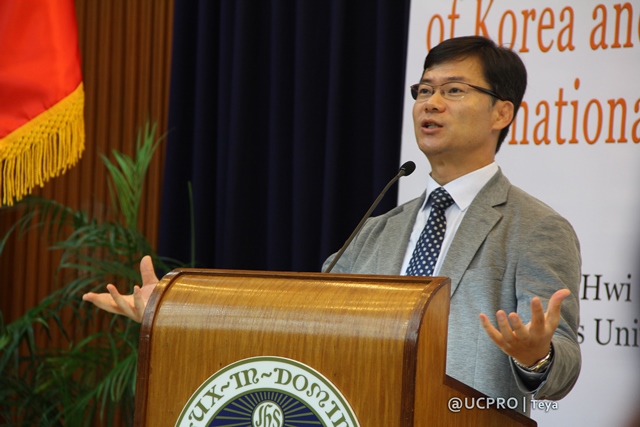Dr. Ihn-Hwi Park, distinguished Professor of International Studies at Ewha Womans University gave a lecture at the Ateneo in early August entitled, "The Security Condition of Korea and East Asian International Relations."
As part of its 2013 Korea Festival in ASEAN, the Korea Foundation sponsored the said lecture with the Ateneo Initiative for Korean Studies (AIKS) and the Ateneo Political Science Department as its co-organizers.
Fr. Jett Villarin SJ, President of the Ateneo de Manila University, delivered the opening remarks for the lecture. He said that the lecture was an "occasion to look at our countries (the Philippines and Korea) within the broad perspective of East Asia."
The same was conveyed by Korea Foundation President, Dr. Hyun-Seok Yu, adding that the "Korea Festival in ASEAN" hopes not only to introduce Korean culture to Southeast Asia but also to promote Korea-ASEAN relations through various forms of cultural and academic exchanges. Dr. Yu likewise said that the foundation will ensure the promotion of better relations between Korea and the Philippines by helping build stronger partnerships through institutions such as Ateneo and Sogang universities.

Dr. Ihn-Hwi Park
During the lecture, Prof. Ihn-hwi Park said that one of the most pressing security concerns that surfaced after the Korean War was the nuclear capability of North Korea. "… North Korea's nuclear development has been the center of security concerns of the international community."
North Korea sees nuclear power as vital for their national security, adding that "they [the North] identify their national security as leadership security."
He enumerated the outcomes of North Korea's nuclear diplomacy to include, among others, the internationalization of the Korean problem and the justification of US' and China's intervention in Korea.
The North Korean problem was also said to pose new security concerns both to the "trust-building process in the Korean Peninsula as well as to the future of six-party talks."
At the end, Prof. Park suggested the need for engagement by other Asian countries, especially those in Southeast Asia, in promoting denuclearization and normalization of relations in the East Asian region. According to him, "this will promote a greater chance of unification in the Korean peninsula and also of East Asian economic and political prosperity."
After the lecture, the presidents and representatives of the Korea Foundation, Ateneo de Manila University and Sogang University signed a Memorandum of Understanding for the promotion of Korean Studies.
Press release and photo from Ateneo de Manila University
Press release and photo from Ateneo de Manila University